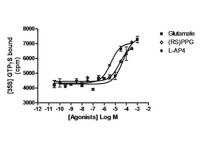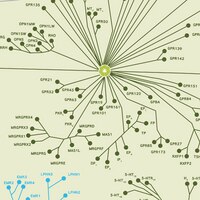HTS149M Sigma-AldrichChemiSCREEN™ Membrane Preparation Recombinant Human mGlu6 Metabotropic Glutamate Receptor
Human mGlu6 GPCR membrane preparation for Radioligand binding Assays & GTPγS binding.
More>> Human mGlu6 GPCR membrane preparation for Radioligand binding Assays & GTPγS binding. Less<<Recommended Products
Overview
| Replacement Information |
|---|
Key Specifications Table
| Species | Host Cells | Protein Target |
|---|---|---|
| Human | Chem-1 | mGlu6 |
| References |
|---|
| Product Information | |
|---|---|
| Format | Membranes |
| Presentation | Liquid in packaging buffer: 50 mM Tris pH 7.4, 10% glycerol and 1% BSA with no preservatives. Packaging method: Membrane protein was adjusted to 1 mg/ml in packaging buffer, rapidly frozen, and stored at -80°C. |
| Quality Level | MQ100 |
| Physicochemical Information |
|---|
| Dimensions |
|---|
| Materials Information |
|---|
| Toxicological Information |
|---|
| Safety Information according to GHS |
|---|
| Safety Information |
|---|
| Storage and Shipping Information | |
|---|---|
| Storage Conditions | Maintain frozen at -70°C for up to 2 years. Do not freeze and thaw. |
| Packaging Information | |
|---|---|
| Material Size | 200 units |
| Transport Information |
|---|
| Supplemental Information |
|---|
| Specifications |
|---|
| Global Trade Item Number | |
|---|---|
| Catalog Number | GTIN |
| HTS149M | 04053252734236 |








